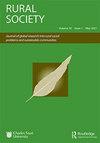Private farmland autonomous adaptation to climate variability and change in Cameroon
IF 1.1
Q3 SOCIOLOGY
引用次数: 4
Abstract
ABSTRACT Rural communities areinherently vulnerable to global warming-induced climate change. This article examines farmland management choices and evaluates the income strategies made in climate change scenarios to ensure resilience. A Heckman probit model and a Ricardian revenue function are applied to information generated from 215 farms sampled in western and northern Cameroon. Economic factors, as well as geographic factors, are shown to influence the likelihood of perceiving and adapting to climate change. Climate influences revenue both in linear and quadratic forms, with temperature and rainfall significant in key farming seasons. The marginal impacts of climate are positive, whilst revenues decrease with summer temperature. Farm revenue is shown to be elastic for spring temperature but inelastic for summer temperature. A warming of 1.5°C leads to declines in revenue of about 4.3% without adaptation. When warming is increased to 2.5°C losses are shown to increase by 7.3%. These losses are lower when adaptation is considered.喀麦隆私有农田自主适应气候变率和变化
农村社区天生就容易受到全球变暖引起的气候变化的影响。本文考察了气候变化情景下的农田管理选择,并评估了为确保恢复力而制定的收入策略。赫克曼概率模型和李嘉图收入函数被应用于从喀麦隆西部和北部215个农场取样产生的信息。经济因素以及地理因素已显示对感知和适应气候变化的可能性有影响。气候以线性和二次形式影响收入,在关键的农业季节,温度和降雨非常重要。气候的边际影响是积极的,而收入则随着夏季温度的升高而减少。农业收入对春季温度有弹性,而对夏季温度无弹性。如果不采取适应措施,升温1.5°C将导致收入下降约4.3%。当升温增加到2.5℃时,损失将增加7.3%。当考虑适应时,这些损失会更低。
本文章由计算机程序翻译,如有差异,请以英文原文为准。
求助全文
约1分钟内获得全文
求助全文

 求助内容:
求助内容: 应助结果提醒方式:
应助结果提醒方式:


